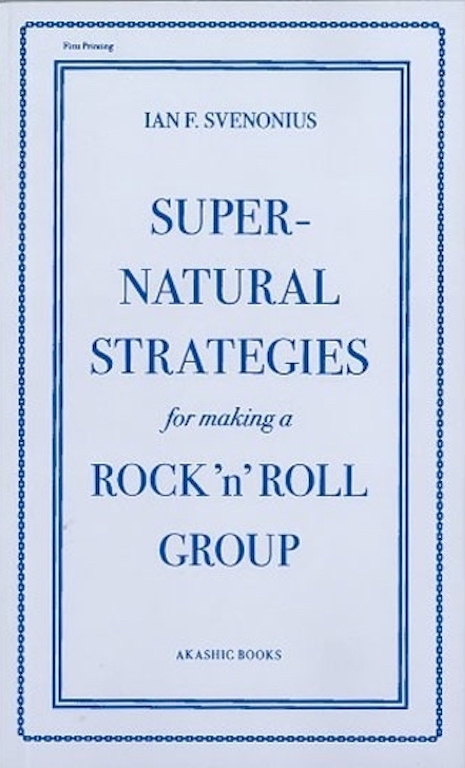


Fittingly, Plays Pretty for Baby begins with a screech of feedback and some shouted poetry that beckons souls “who take pleasure in twilight who are lured by noise to every treacherous abyss.”

IAN SVENONIUS SUPERNATURAL FULL
It conjures a “hickey underworld,” full of teen delinquents dancing to “the real anti-parent culture sound.” In one song, Svenonius screams, “Come into my quarantine”: a great metaphor for the cozy, claustrophobic subculture that the Nation of Ulysses and the bands they toured with, like riot grrrl pioneers Bikini Kill, thrived in, before the fever subsided in the mid-90s. The album is deliberately cultish: a mix of dissonant hardcore and raging, “sore-throated” lyrics meant to foment a revolution (Svenonius described it as more akin to a “zip-gun” than an album - as always, he was half-kidding, but only half). His first, and most influential outfit, the Nation of Ulysses, released their debut LP 13-Point Program to Destroy America in 1991 on the Washington D.C.-based Dischord label their 1992 follow-up, Plays Pretty for Baby, is a DIY classic, made in exile from the spotlight then illuminating “alternative” rock. Over the past three decades, Svenonius has released dozens of albums as the front man of various bands that combine radical style, subversive politics, and clever jibes at the mainstream. On another, though, it’s serious and slyly insightful about the music-industry machinations and socio-political forces that make it possible for a band to “define a generation.” (The Byrds were on to something.) It is also personal: nearly every sentence has an undercurrent of mordant lament about how the 1990s underground music scene Svenonius helped create has become fodder for a certain kind of fantasy about lost authenticity - just like so many countercultural styles that have come and gone before.Īnd though Svenonius plays it cool, the decline of underground music into a procession of increasingly empty signifiers must be wrenching to him. On one level, Supernatural Strategies is a spoof of the very idea of a rock ’n’ roll book. He’s earned a cult following for a kind of satire that bristles with arch provocation. That glib invocation of “empowerment” via rock ’n’ roll is a signature of Svenonius’s style. A good group may “define a generation,” but the high-water mark today is playing a “curated” festival on an upscale New York pier, where the Velvet Underground references are always just so (ATP was rebranded “I’ll Be Your Mirror” when it came to New York last year Svenonius’s reunited band The Make-Up played). His latest book, Supernatural Strategies for Making a Rock ’n’ Roll Group: A How-To Guide, promises to reveal the inside scoop on forming a band, “empowering” the reader to “tour the world, and record so as to create a myth which might define a generation, inspire a movement You might even perform at the All Tomorrow’s Parties Festival if you play your cards right.” Svenonius should know: he’s done all that, and yes, he’s also harmonizing with The Byrds here, updating their sardonic note about rock bands' constricted prospects. What’s a youngster with a USB Stratocaster to do?Īsk Ian Svenonius, a DIY rock musician who has had an influential 25 year career. By now that song has been covered countless times, “jangle-pop” is a well-worn (not to say worn-out) genre, and there’s 70-years worth of rock back-catalog to reckon with, along with scores of Retromaniacs who have repurposed every flicker of rock ’n’ roll flame. Tambourine Man,” the sodden, slightly subversive Bob Dylan folk song, into a jangly pop tune delivered with a crooked smile. After all, they had already made their fortune by transforming “Mr. In 1967, The Byrds could afford to be gently cynical about the tainted prospect of pop acclaim (“with your hair swung right / and your pants too tight / It’s gonna be alright,” they sang, mocking The Monkees, in “So You Want to Be a Rock ’n’ Roll Star”).


 0 kommentar(er)
0 kommentar(er)
